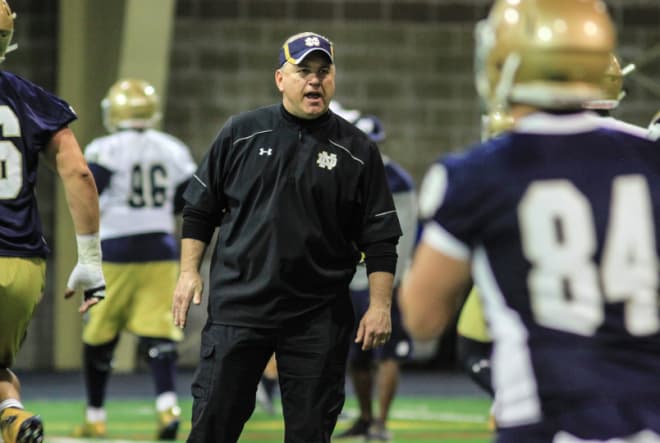Jeff Quinn Adds To Notre Dame’s On-Field Product

Over the years, the NCAA has put limits on the size of a college football program’s coaching staff. Teams can have only nine full-time assistant coaches responsible for on-field coaching and performance. They can also have four graduate assistant coaches, but recent rule changes have limited who can serve in that role.
In order to improve the quality of the product teams are putting on the field, the role of analyst has become far more prominent in college football. While the responsibilities of an analyst might vary from team to team, the basic idea is to have someone who can spend his time breaking down film, self scouting, and spending time thinking outside the box regarding schemes and/or how practices are managed.
A year ago, Notre Dame head coach Brian Kelly hired two longtime veteran coaches to serve as analysts. On defense, Kelly named 38-year coaching veteran Bob Elliott, who had been an assistant for Kelly the previous three seasons. On offense, Kelly hired Jeff Quinn.
Quinn and Kelly worked together for 20 years, two of which they were coordinators together at Grand Valley State. Kelly was the defensive coordinator while Quinn served as the offensive coordinator and line coach. When Kelly was named the head coach in 1991, he retained Quinn and the two worked side by side the next 18 years, winning back-to-back national titles in 2002 and 2003 with the Lakers.
When Kelly moved onto Central Michigan (2004-06) and Cincinnati (2007-09), Quinn went with him in the same capacity, helping lead the Bearcats to back-to-back BCS bowls. Quinn then was hired by the University of Buffalo to be its head coach around the same time Kelly was hired by Notre Dame. He spent almost five years in charge of the Bulls, leading them to the 2013 Famous Idaho Potato Bowl.
In 2015, Kelly brought Quinn back to be an offensive analyst, and along with veteran coaches like Harry Hiestand (offensive line) and Mike Denbrock (associate head coach/wide receiver), as well as up-and-coming coaches like Mike Sanford (offensive coordinator/quarterbacks) and Autry Denson (running backs), Notre Dame had its best offensive performance in a decade, including its most rushing yards per game (207.6) since 2000.
Trust is huge for coaches, and Kelly clearly trusts Quinn. Vital to Kelly was getting Quinn in a role that would allow him to maximize him impact on the program. After a year serving as the offensive analyst, Quinn has a new job title as Notre Dame’s assistant strength and conditioning coach, aiding the efforts of director of football strength and conditioning Paul Longo. Quinn’s new role will be unique, and it should allow him to have an even greater impact on the on-the-field product for Notre Dame.
As an analyst, Quinn was not allowed to be as involved in the day-to-day relationship building with players. During practice, rules stated that he was not allowed to do any coaching or work in any capacity with players. While the work he did as an analyst indirectly helped improve the on-field product, his impact was a bit limited.
As an assistant strength and conditioning coach, Quinn will have daily involvement with players. Not only will he be working with players every day in the weight room, Quinn’s new role will allow him to interact with them during practice. While he will not be coaching a specific position, his ability to interact with players can only serve as a benefit to them and the other assistant coaches.
This is more than just a ploy to get another coach onto the field. Quinn has been certified to be a strength coach, and his 20 years coaching at the Division II and Division III levels will have provided him with a great of experience in this department. Unlike the Football Bowl Subdivision level, which fully staffed strength and conditioning departments, Division II and Division III football coaches are far more active and involved in the weight room.
The unique part of Quinn’s role is that unlike most strength and conditioning coaches, he will have some responsibilities similar to that of an analyst. Kelly was clear that while Quinn’s primary role will be with the strength and conditioning program, his chops as a football coach would still be utilized.
Being a part of the strength and conditioning staff also provides Quinn with the opportunity to be more hands on during the summer workouts, which coaches are not allowed to attend or be a part of in any way. With Quinn involved, it provides Notre Dame with another qualified individual to work strength and conditioning, but it also provides a set of eyes that understands more than most what it takes to translate those skills onto the football field.
Having Quinn more actively involved with the players is a win-win for both players and coaches. Continuing to have him involved with analysis and weekly preparations adds another gifted and experienced mind and set of eyes to the staff. The end result should be another strong year of offense for Notre Dame.